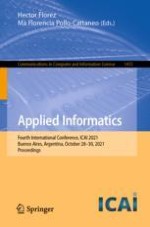2021 | OriginalPaper | Buchkapitel
An Improved Machine Learnings Diagnosis Technique for COVID-19 Pandemic Using Chest X-ray Images
verfasst von : Joseph Bamidele Awotunde, Sunday Adeola Ajagbe, Matthew A. Oladipupo, Jimmisayo A. Awokola, Olakunle S. Afolabi, Timothy O. Mathew, Yetunde J. Oguns
Erschienen in: Applied Informatics
Aktivieren Sie unsere intelligente Suche, um passende Fachinhalte oder Patente zu finden.
Wählen Sie Textabschnitte aus um mit Künstlicher Intelligenz passenden Patente zu finden. powered by
Markieren Sie Textabschnitte, um KI-gestützt weitere passende Inhalte zu finden. powered by
